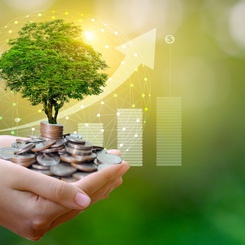The effects of climate change and the associated natural disasters, as consequences of pollution and human overexploitation of the environment, have probably never been more obvious. While certain countries are denying the reality of climate change and refusing to be part of the Paris agreement, cities, states and companies all around the world are taking their own initiatives towards a sustainable future for our planet. In that sense, the European Union has stood by its views and in 2018, while we are only a few days away from the opening ceremony of the twenty-fourth session of the Conference of the Parties (COP24), preventing the dangerous consequences of climate change is more than ever a key priority for the 28 member states.
Green is the New Black, or... Is It?
Europe is working hard to cut down its greenhouse gas emissions while encouraging other nations and regions to do likewise. Government officials in many countries took turns in suggesting increased environmental taxation. It appears that both consumers and investors are showing a rising interest in sustainability and environmental impact of firms. To address the problem, the European Environment Agency introduced the carbon emission market. Going green appears to be trendy if not (almost) fashionable. The fact is that green products have never been as attractive to consumers as they are today, which implies a rapid development of environment-friendly industries. As a result, the market for green products has become a source of innovation and growth. Despite this tendency, companies which work towards a sustainable economy see their stocks in a difficult position. “Green” stocks have generally lower returns than stocks issued by traditional firms, i.e. firms whose strategy does not include environmental awareness. The latter do not and will not hesitate to exploit natural resources for profits. Consequently, these “dirty” stocks generally present higher returns than green stocks. It may seem absurd but this process is self-feeding, i.e. dirty stocks have higher returns, which implies that the firm has more value, more capital, and more opportunities to keep using dirty resources, which again will make the firm even more profitable.
But what if another scenario were possible? What if there were a way to make green stocks more attractive than dirty stocks? What if stocks were taxed according to the environmental impact of the firm business? In other words, what if environmental awareness were introduced earlier in the process, way before the “introduction” of consumer education?
This is what professor of finance Roméo Tédongap suggests in his research project. The idea is simple and relates to the existing classification of consumer products according to their level of energy efficiency. For instance, a fridge using small amounts of energy is a class A whereas a less efficient fridge will obtain a lower rating such as B, C or D. As we all know, products that are rated A are the most expensive. This means that consumers have to pay the additional cost if they want to be greener, i.e. the cost of an environmental-friendly behavior is put on the end consumer. At the same time, firms keep having an incentive to produce cheap and energy inefficient products as lower prices are more attractive to consumers. Bottom line, consumers are currently being financially penalized for wanting to join the green side of the force.
Getting around the System
Professor Tédongap suggests that the financial burden should be laid on the company producing the product instead of the consumers. Thus, instead of labeling the final products according to their energy efficiency, Professor Tédongap advocates that firms be classified instead according to their sustainability. This label would not be based on the energy efficiency of the final product but it would capture the Environmental Impact (EI) of the firm business ranging from the inputs used, the technology employed, all the way to the ecological quality of the final good or services. By introducing the tax upstream, the EI of a firm becomes a key determinant of the stock returns of that company. The EI may be assessed through an Environmental Performance Index (EPI) that would account for the Global sustainability strategy of the firm, the Resources it uses (renewable vs. non-renewable), the Energy efficiency of the production process, the Ecosystem of the firm and the Non-harmful exploitation of the environment. This is what he calls the GREEN criteria. In practice, these criteria could be established and evaluated by an independent agency.
More precisely, an upstream taxation would compel profit-driven investors to reallocate their portfolio towards more sustainable companies. Consider for instance a firm whose stock has a low GREEN rating. The firm business is clearly bad for the environment. Each time this stock is sold, the buyer should pay a tax. In other words, each time a stock with a bad rating is sold, the buyer would have to pay not only the stock but also an environmental tax depending on the stock’s GREEN label, making the asset less attractive in terms of returns. Conversely, if an investor buys a stock with a good GREEN rating, i.e. the underlying firm is respectful of the environment, the buyer should be compensated for example in the form of a lower tax rate on dividends, whereas the dirty stock dividend should be subject to a more important taxation. The tax surpluses could either serve as a subsidy for green technologies or face real negative externalities on the society. In either case, the tax would represent a wealth transfer from the financial markets to the real economy. And we know that financial markets react quicker than the real economy. In short, the GREEN label would not only allow the transfer of the tax burden but would also improve the reactiveness to the tax policy.
The recent alarming UN report stressing out the climate urgency (“nations must triple efforts to reach 2°C target”) along with the recent IPCC (Intergovernmental Panel on Climate Change) Special Report provide the scientific underpinning for the UN 2019 Climate Summit, which will convene on the theme of ‘A Race We Can Win. A Race We Must Win”. In this particular climate, we wish professor Tédongap a fair wind on his journey and we are looking forward to reading the first set of research findings!









